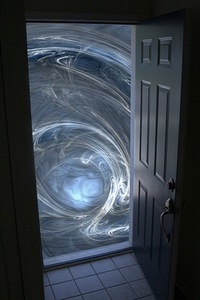9 Reasons Why Everyone Should Lucid Dream
11:24 AM Tuesday, June 11, 2013
Here is my list of the 9 reasons why everyone should lucid dream. These include profound benefits that touch all of us, no matter our culture, beliefs or life circumstances. Ultimately, I think all of these benefits put together would play a serious role in advancing the human race, if only it was something that came naturally to all of us. What I'm really saying is: lucidity is a powerful mental tool like no other.
1. Lucid dreaming creates freedom and escapism.
This is probably the one and only reason most people initially pursue consciousness in dreams - to have sex with their secret crush, to re-enact a day in the life of Jack Bauer, or to fly like an eagle over breathtaking scenery. We all have unfulfilled desires and lucidity is an amazing way to experience them in stunning realism. It is our natural virtual reality headset, our one portal to other worlds where we can temporarily escape this reality and live the life of our dreams... Literally.
 If you're not a lucid dreamer, think of this escapism as akin to watching a movie or diving into a novel. But here, you are the central protagonist and all the characters, plot twists and epiphanies are profoundly tailored to your needs. An experienced oneironaut can manifest anything they want in a guided dream, or they can let the dream movie play out of its own volition. This gives us both the ultimate power to create any situation imaginable, and the thrill of being presented with unexpected twists and turns produced by our own subconscious.
If you're not a lucid dreamer, think of this escapism as akin to watching a movie or diving into a novel. But here, you are the central protagonist and all the characters, plot twists and epiphanies are profoundly tailored to your needs. An experienced oneironaut can manifest anything they want in a guided dream, or they can let the dream movie play out of its own volition. This gives us both the ultimate power to create any situation imaginable, and the thrill of being presented with unexpected twists and turns produced by our own subconscious.
Many people never get over the need for escapism in lucid dreams. The important thing is to remember - at least every now and then - to reach beyond the novelty value and see the potential of conscious dreaming as it truly stands.
2. Lucid dreaming reveals the power of your brain.
If you've never had a lucid dream, taken psychedelic drugs, or experienced profound meditation, then you are yet to reflect on the nature of human perception and awareness.
Have a look at your surroundings right now. I mean really look. Question whether any of it is real. How is it that you can see everything in such detail? What processes occur in your brain to make vision possible? What if you trip your information processing abilities, and the things you can see become a little less tangible? To understand what I'm poking at, watch this extraordinary TED video in which Jill Bolte Taylor got a research opportunity few scientists would wish for: she had a massive stroke and was able to study her own brain functions (motion, speech and self-awareness) shut down as it happened.
When you become conscious in the dream state, you have an astonishing opportunity to experience a vivid and tangible dreamworld that is not actually real. Probably the most shocking example of this is a false awakening, where the dreamer becomes convinced they are awake - so vivid is the detail of the dream. Think about that: in a sleep state, where your body is processing only the tiniest amounts of external stimulus, your internal world is as rich as it ever was. Your brain realistically reproduces a world with tables, buildings, gravity, air, emotions, atoms (in fact anything you can conceive of) and it's very lifelike. While limited to the scope of your subconscious imagination, the lucid dream world is still a shocking place which truly has the capacity to mimic reality.
After the tragic Arizona shootings by the disturbed 'conscience dreamer' [sic] Jared Lee Loughner, some naive commentators suggested that anyone who confused dreams with reality must be mentally ill. Clearly, they had never experienced a lucid dream. And they forgot to make the clear distinction: when awake, I know I am awake. That's all fine and good. However, when dreaming, there is much confusion. Most people don't even know they're dreaming while it's happening - and I wouldn't call "most people" mentally deluded. It seems to be that lucid dreamers are actually ahead of the game. They have the insight to know when they're dreaming, at least part of the time. They are much better primed to distinguish the difference between dreams and reality.
Rather than use lucid dreaming as a scapegoat in what was quite obviously a case of mental instability, we should revere conscious dreaming for the wonder that it is. This special phenomenon, reserved only for those bold enough to delve into altered states, gives us a safe and natural way to explore the depths of human consciousness and perception. It has the potential to alter the way we regard the world around us for the rest of our lives.
3. Lucid dreaming prompts us to question the nature of reality.
 In questioning the nature of our perception, it naturally leads us to question the nature of reality - that is, the world as it exists around us. Some New Age philosophies suggest that consciousness creates reality, but I tend to believe it is the other way around. The universe was born first and did rather well for 12 billion years before the little critters on planet Earth developed consciousness. But why did it all happen? Does our very existence spring from another universe? Are we a hypothetical outcome - Schrodinger's living cat? Or is ours the only universe, the only reality, in existence?
In questioning the nature of our perception, it naturally leads us to question the nature of reality - that is, the world as it exists around us. Some New Age philosophies suggest that consciousness creates reality, but I tend to believe it is the other way around. The universe was born first and did rather well for 12 billion years before the little critters on planet Earth developed consciousness. But why did it all happen? Does our very existence spring from another universe? Are we a hypothetical outcome - Schrodinger's living cat? Or is ours the only universe, the only reality, in existence?
These are important theoretical questions but ones which can only really be pondered by stepping outside the box of everyday thinking. And lucid dreaming provides a useful platform. For instance, we can ask: where do our dreams take place? Why, when dreams are solely based on our conscious experiences, do we let them disobey the fundamental laws of cause and effect? What can dreams teach us about the nature of reality? And how can we use lucid dreaming as a lens on our conscious experience?
Of course we can have no definitive answers, all we can do is theorize. But I think it is very exciting to use lucid dreaming as a tool to do so.
4. Lucid dreaming is a direct line to the subconscious mind.
Eat your heart out Sigmund Freud. Lucid dreamers can literally talk to their own subconscious mind in the dreamscape.
I once had a nightmare, in which I was being flung by a dark pointy figure up and down a narrow hallway. I wasn't lucid at first, although I was conscious enough to feel pain and each smack really hurt. After two or three smashes I had the conscious insight to ask whether I was dreaming. Of course I was. I didn't waste any time; I marched up to the silhouette man and grab him by the shoulders.
"WHY ARE YOU DOING THIS TO ME!" I shouted. His aggression immediately turned to sadness and childish frustration. "I can't reconcile this," he said, and shoved a notepad in my hands. He has scrawled the words "be loved, love yourself", referring to a philosophical debate I had been having earlier that day: Is it more important to love yourself, or love someone else?
Clearly, my conclusion was at odds with my subconscious. There was absolutely no symbolism required. My inner child was acting out with a massive tantrum - and demanded my attention. Yet it is only when lucid that I have the opportunity to resolve such issues face-to-face.
Instead of fearing the pointy figure or wanting to banish him, I now felt empathy for him. He hadn't understood. So I explained my reasons as if he were a child. Draining away both physically and emotionally, the creature left and I woke up in awe of the childish element that arose from my subconscious self.
5. Lucid dreaming is a training ground for real life.
 Being a virtual reality simulation, the lucid dream world is an ideal place to practice real life skills - from the perfect flying kick to playing classical piano.
Being a virtual reality simulation, the lucid dream world is an ideal place to practice real life skills - from the perfect flying kick to playing classical piano.
Research has revealed that we can increase our procedural memory for fine muscle movements inside a lucid dream. So, after practicing flying kicks for half an hour in a lucid dream, your kicks would literally be better upon waking.
Likewise, in the book Exploring The World of Lucid Dreaming by Dr Stephen LaBerge and Howard Rheingold, a surgeon explains how, before going to sleep at night, he would review his surgical cases for the next day. Then he would become lucid in his dreams and practice them in precise detail. As a result, he was able to refine and polish his techniques and perform procedures much faster than the average surgeon. He credited his edge to lucid dreaming.
6. Lucid dreaming creates a natural high.
The moment when you recognize that you're dreaming, it creates a rush of excitement. It's when you realize that you are back in lucid land, where anything and everything is possible. This natural high stays with you throughout the dream and on waking. A deliciously memorable lucid dream has colored many of my waking days.
Whether you are a complete beginner or an expert oneironaut, we all relish the state of conscious dreaming and take away blissful new experiences almost every time it happens. Such dreams can be euphoric in nature and create memories and insights that will stay with you for the rest of your life. It's probably one of the best natural highs we are capable of creating, in the same class as jumping out of a plane or falling in love.
7. Lucid dreaming helps you to grieve.
Often when we lose loved ones, we have the sense that there is some unfinished business. Whether the death comes suddenly without warning, or slowly and predictably, we would all take that opportunity to have another hour with the deceased. Depending on your beliefs, you may feel the deceased has messages for you (reflections after life is over) and you, too, may have messages for them (unresolved feelings of guilt or anger or simply how much you miss them). So, how do you resolve your unfinished business?
I don't believe that spirits contact us from the afterlife, and the idea of contacting lost loved ones via psychic mediums is a sad state. (I used to believe; how painfully funny it is to look back at the messages I used to "make fit" with my reality. But no, after much experience and critical thinking, I strongly believe mediums are tricking their customers or tricking themselves - or both.) The idea of spirits appearing in our dreams is equally unsatisfying for me.
However, dreams of the dead do have a capacity for grief and healing. You just have to accept that the deceased are not actually visiting you - and that it's just a part of your own subconscious mind playing a role. These dreams tend to occur naturally when you are grieving the loss of someone close to you; thoughts of them during the day will filter into your dreams. But if your loved one doesn't appear to you at night, or you just miss them and want to give them a hug, then dreaming lucidly about them is a wonderful proposition.
Lucid dreams offer us the closure we need to overcome our grief and move on with our lives. That's not to say we want to forget. A lucid experience can enable us to consciously visit any period in our past and re-live those memories; playtime with a childhood pet, conversations with a late parent, and intimacy with a lost partner are all ways to grieve and remember loved ones.
8. Lucid dreaming is like taking a creativity pill.
 We all know that regular dreams can be a bizarre place of inspiration... and when conscious dreaming, we can actively seek out creative ideas and bring them back to the waking world.
We all know that regular dreams can be a bizarre place of inspiration... and when conscious dreaming, we can actively seek out creative ideas and bring them back to the waking world.
Famous painters like Salvador Dali, William Blake and Paul Klee all created artwork inspired by their dreams.
If you're seeking artistic inspiration while lucid, head into a gallery and study the images you find there. They may arise from your memory, subconscious creativity, or a combination of both. But best of all, they will contain elements of your conceptual understanding of the world, which can make for beautiful and baffling interpretations (see Dali's One Second Before Awakening from a Dream Caused by the Flight of a Bee Around a Pomegranate, above, 1944).
Equally, lucid dreams can give way to amazing musical inspiration. Composers like Mozart, Beethoven and Wagner all pointed to dreams as the source of their creativity. Dreams reveal our most creative side because of the free-flow of ideas arising from the subconscious mind, unhindered by the rational conscious.
Pete wrote the song Lucid in a conscious dream - yet listening to its complexity you would hardly believe it was possible. Actually, he told me that the most difficult part of the creative process does not take place in the dreamscape, but in remembering your dreamy creations and reproducing them with the same depth and intensity in the waking world. It is a barrier but I am certain no creative lucid dreamer would give up this magical source of inspiration.
9. Lucid dreaming can advance the human race.
I believe that if every human being became a frequent lucid dreamer starting tonight, our culture, art, technology, medicine, science and even religion would quickly develop in a whole new direction. Imagine if every inventor suddenly had a breakthrough lucid dream about a new invention? If every artist suddenly began producing subconsciously-inspired artwork? If every scientist could suddenly solve advanced problems that had previously left them stumped?
In short, if we all had access to lucid dreams and used them in a productive capacity, we would tap into greater power within. The entire human race would be enriched as a result, individually... and universally.
For step-by-step tutorials in lucidity, check out The Lucid Dreaming Fast Track, my digital course that shows beginners the fastest way to lucid dreams.





Post a Comment